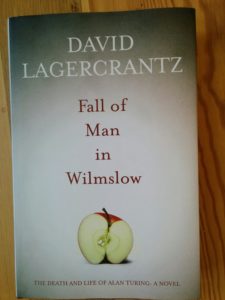It is a novel. A fiction, not a documentary about the life of Alan Turing. This is important because people tend to take every word for granted, weighing it carefully, comparing it to proved facts about the man who helped to break Nazi Germany’s Enigma code.
David Lagercrantz takes those facts and some more (Alan’s homosexuality, his somehow awkward behaviour, his genius) and unfolds his story from the very last day of Alan’s life and the moment his corpse is discovered by a local policeman. This man, Detective Constable Leonard Corell, takes a very special interest in this case that seems to be nothing more than suicide. Step by step he dives deeper into the life and thinking of Alan Turing – a journey which doesn’t leave his own life untouched.
„(I)f indeed anyone was an unbreakable code then it was Alan himself.“
„The Fall of the Man in Wilmslow“ is a thrilling story that hooks you from the very first page. If (and this is an if I only can claim for myself) you already know something about Alan Turing’s life and impact. Then you find hints you have read elsewhere, imagine pictures, films or documentaries you have seen or listen to and you will be able to find your pace between fact and fiction this novel is constantly mixing up. If you haven’t stumbled upon Alan Turing at all, you probably will be lost in between the complexity of the story that hops from the past to the present and back again, changes perspectives and comes up with names and places you might find confusing because you have never heard of them. If you still want to find out more about Alan Turing, start with a biography (or click on the link given below).
David Lagercrantz: Fall of the Man in Wilmslow. The death and life of Alan Turing. A Novel, MacLehose Press, about 9£.
You find more about Alan Turing here on my blog.


